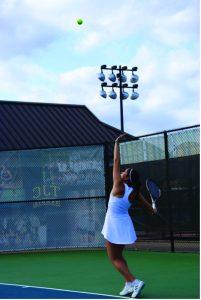
Natalia Garcia, freshman psychology major at TJC, tosses the tennis ball up into the air as she begins the match. Garcia is an international student from Spain.
At Tyler Junior College, discipline is ingrained in the lives of student-athletes, reflecting a commitment to both athletic excellence and academic achievement. Student-athletes often adhere to demanding practice schedules, which can involve up to 20 hours per week during the season, aligning with NCAA regulations. These schedules encompass early morning workouts, afternoon training sessions, and weekend practices, all designed to enhance physical conditioning and team cohesion.
However, developing the mental toughness to push through challenges and understanding the role discipline plays in their success are what set them apart.
Same as a film becomes a favorite among moviegoers because of the hard work behind the scenes, athletes achieve success through dedication.
“Discipline means doing things even when you don’t feel like it. You might not want to go to practice every single day, but you still show up and give 100%,” said Natalia Garcia, a Spanish tennis player at TJC majoring in psychology.
“Perfection” and “discipline” may seem similar in meaning; however, there is a subtle difference, as being self-disciplined is not about being perfect but about being consistent.
“When things start to go wrong or not exactly as you want them to go, just tell yourself that you need to keep going, and not get rolled up in the negativity of it’s not going well. Just keep fighting until it starts to go your way,” Garcia said.
Therefore, the key to self-discipline lies in the small, yet still difficult, decisions that must be made.
“It’s more about what you do outside of the court than what you do on the court. It’s about the little things you do and trying to give your best every day,” said Sofia Aguiar, a volleyball player from Brazil at TJC majoring in engineering.
In addition, the real game-changer can come when a player faces losses. When hard work seems not to be enough, players often embrace the struggle, trust the process, and find strength in resilience. According to Elite Gymnastics Academy in Miami, which provides top-notch gymnastics training for competitive gymnasts, “athletes use setbacks as opportunities for growth, learning from their mistakes, and coming back stronger than before.”
In the world of sports, challenges and failures come and go all the time. As athletes, being well-equipped with disappointments or getting through them is an everyday task. Garcia said the biggest challenge in tennis is dealing with losses.
“Tennis is a very hard sport because you’re out there by yourself. If you don’t know how to cope with emotions, it’s not just your opponent versus you. It’s also you beating yourself up if you’re not doing the right thing,” Garcia said.
Building self-confidence is crucial because it empowers people to face challenges head-on, push through adversity, and stay motivated even when others might not be around to offer support.
“You need to have some self-respect and encourage yourself to do some stuff. If you don’t have yourself back, who’s going to be there for you?” Garcia said.
Garcia and Aguiar, athletes who have come a long way to become more disciplined, have both found ways to push themselves and stay focused on their goals. Through overcoming obstacles and maintaining a strong sense of self-respect, they have learned to rely on their inner strength, continually striving to improve and excel both on and off the court.
“Things not going your way doesn’t mean that you’re doing the wrong thing. You can still be on the right path, but things don’t always go your way. Even if you’re not there yet, enjoy the change along the way,” Garcia said.